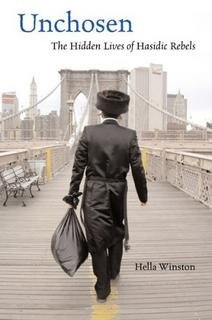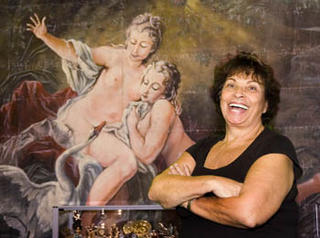I spent some of Rosh Hashanah reading
The Other Side of Israel by Susan Nathan, a Jewish English woman in her 50s who made Aliyah out of Zionist motives and eventually went to live in an Arab-Israeli town in the Galilee, Tamra.
I don't really recommend this book, as Nathan wastes a valuable opportunity to give a powerful and influential account of the uphill struggle facing Israeli Arabs and the discrimination against them, and to offer Israelis and diaspora Jews a thought-provoking and objective portrait of Israeli Arab life and instead goes off on a vile anti-Zionist diatribe. She has swallowed the Arab narrative hook line and sinker; in her account, the Jews are solely to blame for Arab suffering and reconciliation will only begin when we recognize that the establishment of the state was an unjust catastrophe for the Arabs, and apologize. This woman actually celebrates the
Nakba; enough said.
The reason I don't recommend the book is not because I don't think we should read such things; it's always useful and thought-provoking to be familiar with the other side's take. It's just that the book is so unbalanced, so extreme and so ideologically driven it's not really useful as a good analysis of the Israeli Arab relationship with the state or lifestyle, which is what there's really a need for.
In any case, all that by way of background to what I really wanted to say about the book... Which is to address the one interesting question: How did a woman who grew up in a Zionist home, brought her kids up as Zionists and made Aliya out of Zionist motivations come to make such an about-turn?
The change began when she spent some time in Hadassah Ein Kerem, and was first exposed to Israeli Arabs. Somewhat amazingly, she seemed to have had no inkling that they existed: "The Jewish state was clearly a lot less ethnically pure than I had been led to believe" (p. 48 in the UK edition). She was then startled to see a religious settler wandering around the hospital with a gun slung over his shoulder:
"I engaged him in concersation as he was leaving. In a strong American accent he told me: 'I've just requisitioned an Arab home in East Jerusalem. I never leave home without a weapon.' I suggested to him he would be better off living in the Jewish quarter in the Old City. No, he retorted. 'All of East Jerusalem belongs to the Jews.'
His words left a nasty taste in my mouth... I left the hospital confused by the signals Israel was sending me."
A few months later, she was asked to help out with an organisation working to aid disadvantaged communities in Israel, including Israeli Arabs; as she read about the Arab communities, she decided to meet them for herself -- "I could not live long in ignorance" -- and before long, actually decided to move to an Arab town. As she becomes more familiar with the daily and systematic discimination facting this sector, her anti-Zionism grows.
What's interesting (to me) here is her profound ignorance about Israeli society when she came to live in Israel, although she was a proud Zionist, grew up in a Zionist home etc. and was no stranger to Israel. In essence, she blames her Jewish/Zionist education for presenting her with a false idea of what Israel actually is, and the encounter with the 'real' Israel -- rather than the idealistic Israel -- is enough to tip her over the edge.
It would be easy to say that anyone who does not realize that Israel has Arabs who are citizens in it, who do not realize the many injustices Israel does carry out in its Arab sector, who does not see Israeli history in a sophisticated manner rather than in a haze of mythology, etc. etc. etc., is simply ignorant and an idiot. Unfortunately, Susan Nathan is by far not the only diaspora Jew who sees Israel extremely naively and fully expects to be greeted, on landing, by kibbutznikim in
kova tembels driving a tractor across the runway. (On my year off in Israel, one of my roommates, an Australian who had been through a Jewish day school but never visited before, told me completely seriously that she was surprised to discover there were no camels on the roads in Jerusalem.)
I've been shocked to hear many otherwise intelligent and sophisticated people acting shocked when they discover some of the less perfect sides of Israeli life, history and ideology. Most can cope and adjust; many are, to varying extents, disillusioned. Where this leaves our education is hard to say, because it is obviously hard to strike a balance between instilling a love of the country, and an idealism, in people who are only exposed to Israel from a distance, and giving them a fair and realistic picture. However, I do think some more realism is in order; Susan Nathan is simply the most extreme example of just how much damage naivete can do.



